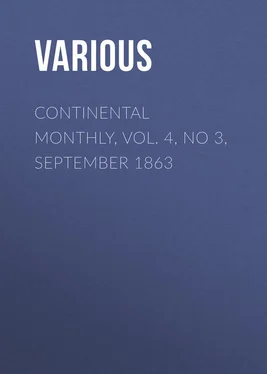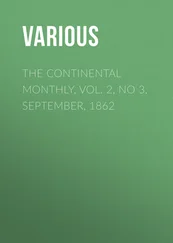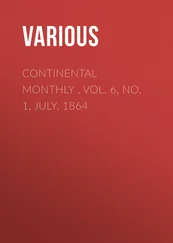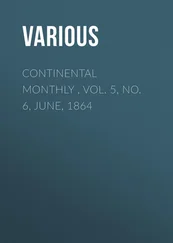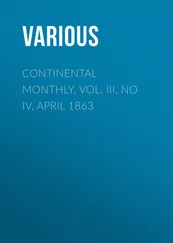Various - Continental Monthly, Vol. 4, No 3, September 1863
Здесь есть возможность читать онлайн «Various - Continental Monthly, Vol. 4, No 3, September 1863» — ознакомительный отрывок электронной книги совершенно бесплатно, а после прочтения отрывка купить полную версию. В некоторых случаях можно слушать аудио, скачать через торрент в формате fb2 и присутствует краткое содержание. Жанр: periodic, Языкознание, periodic, foreign_edu, на английском языке. Описание произведения, (предисловие) а так же отзывы посетителей доступны на портале библиотеки ЛибКат.
- Название:Continental Monthly, Vol. 4, No 3, September 1863
- Автор:
- Жанр:
- Год:неизвестен
- ISBN:нет данных
- Рейтинг книги:3 / 5. Голосов: 1
-
Избранное:Добавить в избранное
- Отзывы:
-
Ваша оценка:
- 60
- 1
- 2
- 3
- 4
- 5
Continental Monthly, Vol. 4, No 3, September 1863: краткое содержание, описание и аннотация
Предлагаем к чтению аннотацию, описание, краткое содержание или предисловие (зависит от того, что написал сам автор книги «Continental Monthly, Vol. 4, No 3, September 1863»). Если вы не нашли необходимую информацию о книге — напишите в комментариях, мы постараемся отыскать её.
Continental Monthly, Vol. 4, No 3, September 1863 — читать онлайн ознакомительный отрывок
Ниже представлен текст книги, разбитый по страницам. Система сохранения места последней прочитанной страницы, позволяет с удобством читать онлайн бесплатно книгу «Continental Monthly, Vol. 4, No 3, September 1863», без необходимости каждый раз заново искать на чём Вы остановились. Поставьте закладку, и сможете в любой момент перейти на страницу, на которой закончили чтение.
Интервал:
Закладка:
It was not long before Franklin was arrested by the Government, and imprisoned four weeks in the common jail, for the conduct of his paper. The council also published an order, setting forth that Franklin had published many passages, boldly reflecting upon the Government of the province, the ministry, the churches, and the college, and that it often contained paragraphs tending to fill the readers' minds with vanity to the dishonor of God, and the service of good men – in consequence of which, it was resolved that nothing should be published in the said colony, that had not been first perused and allowed by the secretary of the colony.
The order does not seem to have been enforced; and the first number of the paper, after James Franklin's release, contained another essay from the club, of increased boldness. It was headed by a sort of a text as follows: ' And then, after they had anathematized and cursed a man to the devil, and the devil would not, or did not, take him, then to make the sheriff and the jailer take the devil's leavings. '
Other publications, equally liberal, and equally offensive to the civil authorities, were brought before both Houses of the General Court, and a joint committee was appointed to consider and report. This committee reported that the tendency of Franklin's paper was 'to mock religion and bring it into contempt.' They therefore recommended that James Franklin be prohibited from publishing anything not previously examined and approved by the secretary. The recommendation was adopted, but Franklin again disregarded the order, for which he was prosecuted for a contempt of the General Court; but the jury ignored the bill. He was, however, bound to good behavior, in conformity to the order of the General Court.
These proceedings were severely attacked in the American Weekly Mercury , which by that time had been established in Philadelphia; and the Assembly of the Province of Massachusetts was denounced as being made up of oppressors and bigots, who made religion only an engine of destruction to the people. Their public officers were proclaimed to be remarkable for their hypocrisy, raised up as 'a scourge in the hands of the Almighty for the sins of the people.'
These attacks were undoubtedly written by the club in Boston and sent to Philadelphia for publication. But neither the club nor James Franklin would submit to the order of the Court; and for the purpose of evading it, the name of James was taken out of the paper, and that of Benjamin substituted. The latter was then a minor, and this was the first introduction of his name into public life. But though a poor printer's lad, the name thus first used as a shield for others who were behind the curtains, has since challenged the world for illustrious deeds of his own.
With this change of the name of the publisher, came a new prospectus, probably the first effort of the kind, of the then youthful philosopher. This prospectus was rather an odd one, as will be seen by the following extract: 'The main design of this weekly will be to entertain the town with the most comical and diverting incidents of human life; which in so large a place as Boston will not fail of a universal exemplification. Nor shall we be wanting to fill up these papers with a grateful interspersion of more serious morals, which may be drawn from the most ludicrous and odd parts of human life.'
The character of the paper, however, does not appear to have been changed for the better by the change of names. It was continued in the name of Benjamin Franklin some time after he had left it; but the members of the club at length grew wearied with the labor, and the paper expired in 1727. James Franklin then removed to Rhode Island, and established the first newspaper in that State, at Newport.
It remains to notice but one more of the early Boston editors, who seems to have been an odd fish – somewhat witty, but, to use a homely proverb, 'as rough as a rat-catcher's dog.' He first established the Boston Weekly Rehearsal , in 1731, and afterward the Boston Evening Post . His name was Thomas Fleet. Massachusetts was then a slaveholding country, and Fleet owned several negroes, two of whom he instructed in the art of printing. Their names were Pompey and Cæsar – the only two Romans , I believe, who ever belonged to the printing fraternity. These honest fellows lived and printed until after the war of the Revolution, having become freemen by the Constitution of Massachusetts of 1780. Fleet was droll and witty in the conduct of his paper, especially in his advertisements. Witness the following advertisement of one of his negro women for sale: 'To be sold, by the printer of this paper, the very best negro woman in this town, who has had the small pox and the measles; is as hearty as a horse, as brisk as a bird, will work like a beaver.'
There was a common evil existing in those days which, it is to be feared, has now become chronic. People were prone to omit paying for their newspapers. Fleet had often to complain of this crying sin, even against men of great religious professions. On one occasion he read them quite a severe lesson upon their injustice and oppression in this respect. 'Every one,' says he, 'thinks he has a right to read news, but few find themselves inclined to pay for it. 'Tis a great pity a soil that will bear piety so well, should not produce a tolerable crop of common honesty.'
It is, moreover, slanderously reported in the ancient chronicles, that Fleet was not blessed with the most beautiful and sweet-tempered wife and daughters in Boston. On one occasion he invited a friend to dine with him on pouts , a kind of fish then esteemed a great delicacy, and of which he knew his friend to be remarkably fond. His domestic matters, however, did not move along very smoothly that morning, and when they sat down to table, the gentleman remarked that the pouts were wanting.
'Oh no,' said Fleet, 'only look at my wife and daughters!'
Twenty-one years elapsed from the establishment of a newspaper in Boston, before William Bradford commenced the New York Gazette , in October, 1725. It was printed on a half sheet of foolscap, with a large and almost wornout type. There is a large volume of these papers in the New York City Library, in good preservation. The advertisements do not average more than three or four a week, and these are mostly of runaway negroes. The ship news was diminutive enough; now and then a ship, and some half a dozen sloops arriving and leaving in the course of the week. Such was the daily paper published in the commercial metropolis of the United States, one hundred and thirty-eight years ago!
Eight years after the establishment of Bradford's Gazette , the New York Weekly Journal was commenced by John Philip Zengar. This paper was established for the purpose of opposing the colonial administration of Governor Crosby, under the patronage, as was supposed, of the Honorable Rip Van Dam, who had previously discharged the duties of the executive office, as President of the Council. The first great libel suit tried in New York was instituted by the Government in 1734 against Zengar. He was imprisoned by virtue of a warrant from the Governor and Council; and a concurrence of the House of Representatives in the prosecution was requested. The House, however, declined. The Governor and Council then ordered the libellous papers to be burned by the common hangman, or whipper, near the pillory. But both the common whipper and the common hangman were officers of the corporation, not of the Crown, and they declined officiating at the illumination. The papers were therefore burned by the sheriff's deputy at the order of the Governor. An ineffectual attempt was next made to procure an indictment against Zengar, but the grand jury refused to find a bill. The Attorney-General was then directed to file no information against him for printing the libels, and he was kept in prison until another term. His counsel offered exceptions to the commissions of the judges, which the latter not only refused to hear, but excluded his counsel, Messrs. Smith and Alexander, from the bar. Zengar then obtained other counsel – John Chambers, of New York, and Andrew Hamilton, of Philadelphia. The trial at length came on, and excited great interest. The truth, under the old English law of libel, could never be given in evidence, and was of course excluded on the present trial. Hamilton nevertheless tried the case with great ability. He showed the jury that they were the judges as well of the law as of the fact, and Zengar was acquitted. The verdict was received with cheers by the audience; and the corporation voted the freedom of the city to Andrew Hamilton, 'for the remarkable service done to the inhabitants of this city and colony, by his defence of the rights of mankind and the liberty of the press.' The certificate was sent to Mr. Hamilton by Mr. Stephen Bayard in a superb gold box, on the lid of which were engraved the arms of the city with several classical and appropriate mottoes.
Читать дальшеИнтервал:
Закладка:
Похожие книги на «Continental Monthly, Vol. 4, No 3, September 1863»
Представляем Вашему вниманию похожие книги на «Continental Monthly, Vol. 4, No 3, September 1863» списком для выбора. Мы отобрали схожую по названию и смыслу литературу в надежде предоставить читателям больше вариантов отыскать новые, интересные, ещё непрочитанные произведения.
Обсуждение, отзывы о книге «Continental Monthly, Vol. 4, No 3, September 1863» и просто собственные мнения читателей. Оставьте ваши комментарии, напишите, что Вы думаете о произведении, его смысле или главных героях. Укажите что конкретно понравилось, а что нет, и почему Вы так считаете.
